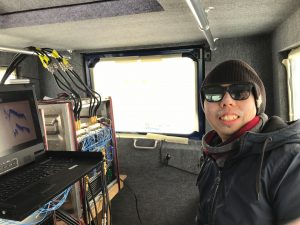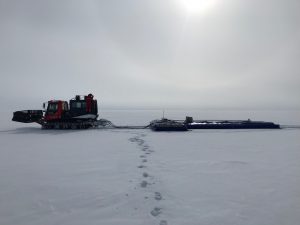
For the second consecutive year, a team of researchers from The University of Alabama traveled to the Arctic Circle to help unveil ancient climate history and provide perspectives on improving climate models.
The researchers from the Remote Sensing Center in the UA College of Engineering were on the ice in northern Greenland as part of an international project to study the North East Greenland Ice Stream. They spent part of the summer conducting radar measurements and testing new radars to map the ice sheet’s bed and ice layers.
“Our role in this project is really remote sensing technology in ice-penetrating radar that has been developed by our faculty and students,” said UA President Stuart R. Bell. “They are able to see through the glacial ice.”
Bell and his wife, Susan, visited the research site at the invitation of Professor Dorthe Dahl-Jensen at the University of Copenhagen. She’s the leader of the project examining the behavior of the ice sheet.
“The purpose of the trip was to see The University of Alabama at work and our researchers collaborating in a very international setting,” Bell said. “It’s always enlightening to see that level of research being conducted and discussed and seeing The University of Alabama serving a critical role in that research.”

It is uncertain how much glaciers and ice sheets will influence rising seas because scientists are not quite sure how they behave, contributing to considerable uncertainty in predictions of future sea levels. The Alabama work aims to provide clarification.
Engineering researchers at UA developed a unique radar to provide an accurate image of what occurs at the base of the ice. The radar is the first of its kind, advancing the use of a type of radar known as ultra-wideband surface-based radar for scanning the interior of ice.
Dr. Siva Prasad Gogineni, Cudworth Professor of Engineering and director of the UA Remote Sensing Center, is lead UA engineering researcher on the project and is an internationally recognized expert in the field of remote sensing.
A UA team went in 2018 and again in 2019. This year’s field team was Dr. Stephen Yan, assistant professor of electrical and computer engineering; Dr. Sevgi Zubeyde Gurbuz, assistant professor of electrical and computer engineering; and Dr. Charles O’Neill, research engineer.
